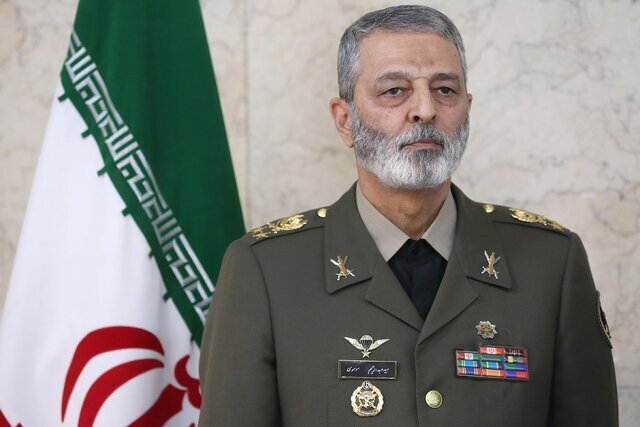Tehran doubts Israeli commitment to truce, warns of stronger retaliation if provoked

TEHRAN — The Chief of Staff of Iran’s Armed Forces has issued a strong warning against any potential Israeli resumption of hostilities, stating that the Islamic Republic stands ready to deliver a decisive and powerful response if aggression resumes.
In a phone conversation on Sunday with Saudi Defense Minister Prince Khalid bin Salman, Major General Abdolrahim Mousavi expressed deep skepticism over the Zionist regime’s commitment to the U.S.-announced pause on hostilities, emphasizing that Iran did not initiate the conflict but responded with full military force when attacked.
“We were not the ones who began this war, but we answered the aggressors with all our strength,” General Mousavi said. “Given our serious doubts about the enemy’s willingness to abide by its commitments — especially the pause in hostilities against Iran — we are fully prepared to deliver a severe response if the aggression resumes.”
The top Iranian commander discussed regional developments and the 12-day war with Israel and the United States, stating that the attack on Iran — which targeted senior military commanders, nuclear scientists, and civilians — was carried out while Tehran was engaged in indirect negotiations with Washington.
“These two regimes have once again proven that they do not respect international norms or legal frameworks,” Mousavi noted. “This fact was made crystal clear to the global community during the imposed 12-day war.”
The aggression, launched by Israel on June 13, triggered a powerful Iranian retaliation under Operation “True Promise III,” during which the Armed Forces struck strategic Israeli military and industrial sites using advanced, precision-guided missiles that overwhelmed the regime’s multilayered defense system.
Although Israel announced a halt to its military campaign last Tuesday following a pause declaration by U.S. President Donald Trump, Iranian officials remain unconvinced. Former White House strategist Steve Bannon acknowledged in an interview that the pause — brokered with help from Qatar — was a desperate move to “save Israel” as it faced retaliation beyond its operational capacity. “They bit off more than they could chew,” Bannon said.
Iran’s concerns are further reinforced by Israel’s long-standing record of breaking ceasefires, particularly in Gaza. In previous conflicts — including those in 2008–09, 2014, and 2023 — Israel repeatedly violated truce agreements within days or even hours, resuming deadly airstrikes on civilian areas. This pattern, Iranian officials say, undermines the credibility of Tel Aviv’s commitments.
Meanwhile, Prince Khalid reaffirmed Saudi Arabia’s condemnation of the aggression and expressed condolences for the Iranian commanders martyred in the attack. He highlighted Riyadh’s efforts to help end the conflict and emphasized the necessity of continued cooperation between Tehran and Riyadh to promote regional peace and stability.
In a separate statement, Brigadier General Esmaeil Kowsari, a senior member of Iran’s Parliament National Security and Foreign Policy Committee, also warned of a forceful response to any renewed aggression or assassination attempts against senior Iranian officials.
“There is no actual ceasefire at the moment — only a temporary pause in hostilities,” Kowsari said. “Everything depends on when the enemy decides to resume its actions.”
“The Americans, the U.S. President, and the Zionists must know this: if they attempt to assassinate any of our senior officials, Iran’s Armed Forces will respond with painful force. The next operation will be even harsher than ‘True Promise III.’ We have never taken enemy threats lightly.”
Both Iranian officials reiterated that the Islamic Republic remains vigilant and resolute in the face of threats — and will not hesitate to act decisively to protect its sovereignty and people.
Leave a Comment